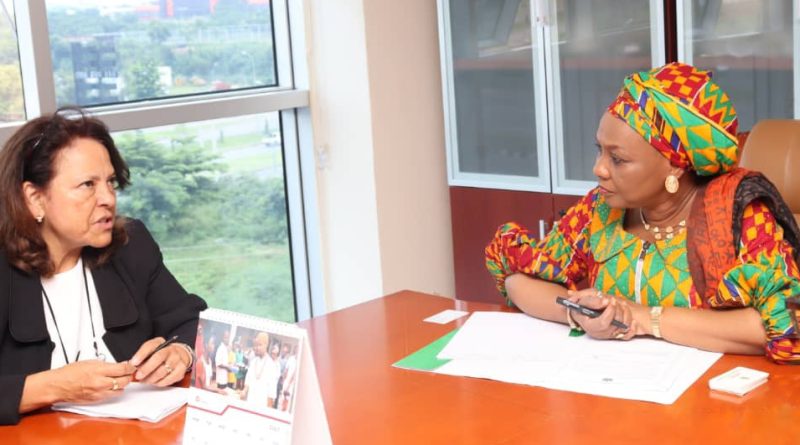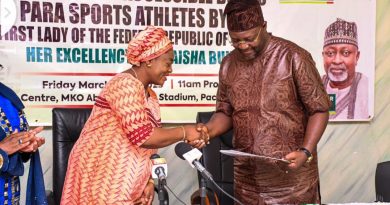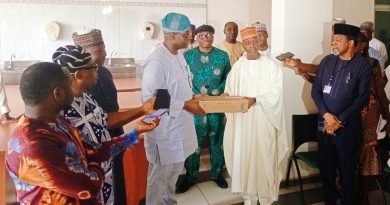PS Monilola Udoh receives UN Security Council Working Group on Children and Armed Conflict
... Reveals many steps Nigeria has taken on safety of children.
Oru Leonard
The United Nations Security Council Working Group on Children and Armed Conflict has paid a visit to the Permanent Secretary of Federal Ministry of Women Affairs, Monilola Udoh for fact-finding on how Nigeria is protecting children caught up in situations of armed conflict or during military operations.
The UN Security Council Working Group led by UNICEF’s Christian Monduate, which came around with Daniel Ohlstein, Kaitlin Brush, Christian Monduate, Ariane Lignier, Nicolas Martin-AchardAndreg Sarushein.
While giving the prelude to Nigeria’s experience at protecting children in conflict situations, the Permanent Secretary of the Ministry, Monilola Udoh disclosed to the visitors that “The Federal Government of Nigeria in her efforts at ensuring the security of children in Nigeria, ratified the Safe Schools Declaration (SSD).”
The Child Right’s Act, she disclosed “has also been domesticated in 35 States of the Federation.”
Udoh further expatiated that “The former President Muhammadu Buhari Ratified the Safe Schools Declaration (SSD) in December, 2019, which is a global commitment to students, teachers and educational personnel as well as the validation of the Minimum Standard on Safe Schools in July, 2021, which signals the Federal Government’s commitment towards ensuring the general well-being of children. All these to ensure that our schools are safe and in pursuant to section 15 of the Child Right’s Act, which gives the child the right to free, compulsory, and universal primary education.”
Other efforts of her Ministry, the permanent secretary listed include:
i. Developed Training Manuals on Safe School’s Declaration (SSD), which was launched for Security Agencies and Human Rights Organizations on the 14th of October, 2021.
ii. Hosted the 1st International Conference on the Safe Schools Declaration in Africa with the theme “Ensuring Safe Education for All, from commitment to practices”.
Furthermore, I use this opportunity to share with you some key interventions of the Ministry towards children who are survivors of terror and violent extremism, especially in the humanitarian emergency. Amongst these are:
ii. “Some school children affected by crisis of terror and violent extremism in Borno, Adamawa and Yobe, were provided with a number of psycho-social support services ranging from medical treatment, school feeding, school bags, books and other educational materials, in collaboration with States Ministries of Women Affairs, the UNICEF, Street Child International, Save the Children among others, in order to support their rapid emotional recovery, school re-enrolment and retention.
iii. The Ministry has had fruitful partnership working with the North-East States’ Ministries of Women Affairs, Plan International; and the UNFPA to provide anti-Sexual and Gender-Based Violence (SGVB) trainings for learners and teachers in conflicts, insurgency and humanitarian emergency host communities; as well as provision of sanitary kits for girls in IDP Camp schools.
iv. In a bid to ensure learning and schools retention in the North-East, the Ministry’s in sustained collaboration with Implementing Partners is supporting access to education and reducing the precarious incidences of Child & Forced Marriage (CFM) escalated by the insurgency and terrorists’ activities.
v. Through the Nigeria for Women Project (NFWP) to help low-income women and mothers come out of extreme poverty through access to soft and cooperative loans facilities; the Ministry has strengthened a number of families’ capacity for children’s development opportunities; thus, enhancing the children’s resilience to incentives and antics used by terrorists and violent extremist groups.
vi. It would be recalled that the Nigerian Government, through the Federal Ministry of Women Affairs, earlier on the 25th of March, 2017, fruitfully engaged with International Partners, precisely the Country Representatives of UN agencies, including the UNICEF, UNFPA, UNHCR, UN WOMEN, and the UN OCHA in support of the completion of the education of the “recused Special Girls” (Chibok Girls).
vii. In collaboration with the Federal Ministry of Education and the Presidential Committee on Victims’ Support Fund, the Ministry succeeded in re-enrolling the rescued “Special Girls” and retaining them in School, including supporting them to tertiary education in the country.
Udoh who also disclosed that “At present, eighty (80) of the “rescued Special Girls” (Chibok Girls) are in various tertiary institutions undergoing their studies, however expressed dissatisfaction with the level of education impacted on the rescued girls who were returned to schooling vis-à-vis the amount expended on their fees.
(FMWA Media)




